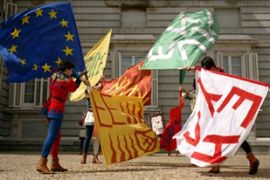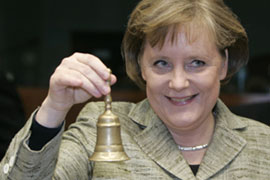EU marks 50th anniversary
European leaders set to approve a “Berlin Declaration” to mark 50th EU anniversary.

In a pre-summit broadcast, she said: “The people have the right to know how we imagine a renewed European Union, one that is capable of action.”
Germany holds the EU’s rotating presidency.
‘Berlin Declaration’
Merkel told reporters she was confident the 27 EU governments could overcome their deep differences over the EU’s future by the 2009 deadline.
The summit marks the 50th anniversary of the signing of the Treaty of Rome by the six core countries of what was then called the European Economic Community.
| “The people have the right to know how we imagine a renewed European Union, one that is capable of action”
Angela Merkel, Germany’s chancellor |
Meeting in Berlin this weekend, the gathered presidents and prime ministers are seeking to agree on a “Berlin Declaration”.
Leaked drafts show the proposed birthday declaration will focus on ideals recalling how the EU has helped establish peace, prosperity and democracy in a continent that spent much of previous half-century mired in war, depression and dictatorship.
Reflecting the weight which the authors hope to give the text, it contains the phrase, “We, the citizens of the European Union, have united for the better,” an echo of the “We the people … ” opening of the US constitution.
Troubled constitution
The declaration is expected to contain no explicit reference to the EU’s controversial constitution, nor to any plans to bring in members beyond its current borders.
The omissions reflect a widespread public disillusionment with an organisation seen by many as a distant and overbearing influence on the lives of citizens, particularly in countries of Western Europe where the EU’s proud record in overcoming wartime rivalries and developing postwar economies no longer resonates with a younger generation.
Such skepticism saw the EU’s constitution rejected in 2005 by referendums in France and the Netherlands – two nations that had traditionally been enthusiastic supporters of European integration and who were founding members of the bloc when the Treaty of Rome was signed in 1957.
Adding to public concern is the prospect of further eastward expansion of the EU into the Balkans, Turkey or Ukraine which many in the West see as a threat to wages and welfare states, coming after 10 former communist nations joined over the past three years.
Merkel hopes to rekindle popular support with a clear statement of the EU’s achievements – from removing trade and travel barriers, to bolstering once-fragile democracies in the Iberian peninsula, Greece and Eastern Europe or in taking a global lead in international development aid and fighting global warming.
Compromise agreed
The nations are hoping to avoid any rows over the constitution to spoil the celebrations, so the word was dropped from the declaration.
 |
| Angela Merkel wants a summit to launch negotiations for a new treaty [Reuters] |
Merkel, following some last-minute diplomacy, has managed to secure agreement on a compromise that at least points a possible way out of the deadlock, calling for a fundamental renewal of the EU over the next two years.
“We must always renew the political shape of Europe in keeping with the times,” the draft says, according to a copy obtained Friday by The Associated Press.
“That is why today, 50 years after the signing of the Treaties of Rome, we are united in our aim of placing the European Union on a renewed common basis before the European Parliament elections in 2009.”
Merkel is pushing a timetable that includes a summit in June to launch six months of negotiations to draw up a revised EU treaty that could be ratified by all EU nations by 2009.
Substantive talks on the constitution are unlikely to get under way until after the French presidential election in April, which will see the departure of Jacques Chirac, who will be attending his last EU summit in Berlin after 12 years in power.